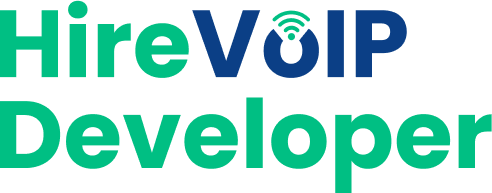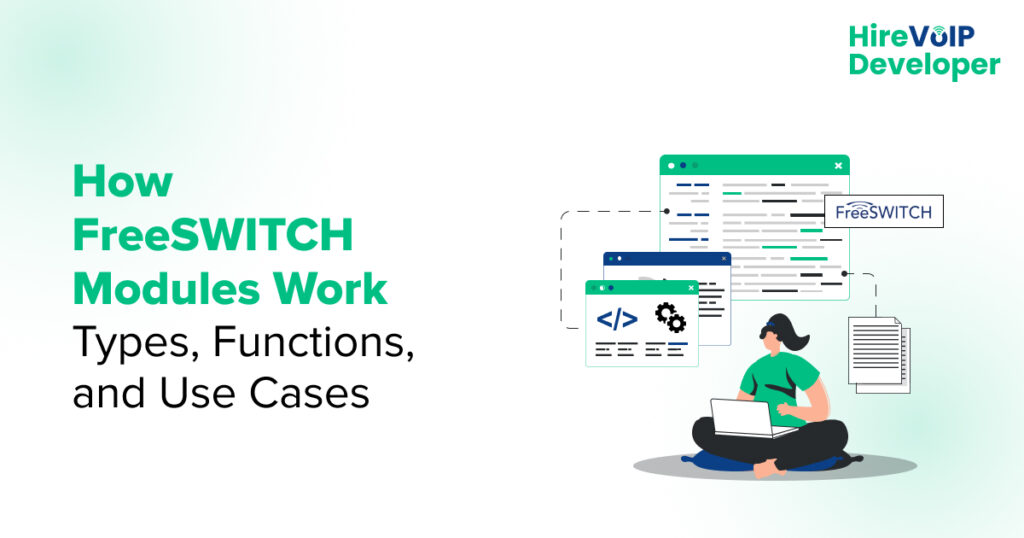Quick Summary
FreeSWITCH modules power everything from IVR flows to call center logic and billing engines. This blog explains different FreeSWITCH modules, how they function, when to use them, and how to approach FreeSWITCH module development for custom needs, whether you’re building for a call center, integrating Google services, or setting up an LCR engine.
Have you heard the term “FreeSWITCH modules” thrown around while exploring VoIP development, but wondered what they are?
Think of FreeSWITCH as a lightweight operating system. Its solid core is supported by modules and plugins that let you build anything from an interactive IVR solution to a full-blown cloud call center. This blog explains the most effective and often used FreeSWITCH modules, including the ICR module, their functions, and when they should (or shouldn’t) be implemented.
What Are FreeSWITCH Modules?
FreeSWITCH modules are dynamic plugins that extend the platform’s core functionalities. Instead of loading every feature by default (which would be heavy), FreeSWITCH loads only the required modules, making the system lightweight, flexible, and customizable.
Whether you need media handling, protocol support, event sockets, or call queues, there’s a module for it.
Think of it like LEGO: use only the blocks you need.
These modules can be:
- Core modules (bundled with FreeSWITCH)
- Third-party add-ons
- Custom-built (aka authoring FreeSWITCH modules)
Now, the next question arises: how do you use them?
Let’s explore how these modules are loaded and brought to life inside your FreeSWITCH system.
How Are FreeSWITCH Modules Loaded?
You load modules in FreeSWITCH through modules.conf.xml.
When you need a new feature, such as speech recognition or advanced routing, you simply add the module to this config file and restart the system.
This is where the keyword FreeSWITCH load module comes in. You’re telling FreeSWITCH: “Hey, bring this capability into play.”
Why FreeSWITCH Modules Matter?
The modular design means:
- You can scale only the parts you need.
- Performance stays optimal.
- You can build a VoIP billing solution tailored to any vertical, such as contact centers, telecom billing, conferencing, AI integrations, etc.
Let’s now explore the FreeSWITCH modules list by function and use case.
1. Media and IVR Modules
Let’s start with the most foundational ones: the FreeSWITCH IVR and media-related modules.
mod_dptools, mod_dialplan_xml, mod_ivr
These handle:
- DTMF detection
- Media playback
- Call bridging
- Prompt recording and playback
- Interactive voice response flows
If you’re building phone menus or call queues, these are your go-to. The FreeSWITCH IVR module is highly scriptable using XML or Lua.
Use case: Banks and hospitals use the FreeSWITCH IVR module to build automated menus for multilingual self-service support.
2. Call Center and Queuing Modules
Enter the FreeSWITCH call center module—aka mod_callcenter.
This module gives you features like:
- Agent tiers and skill routing
- Queue management
- Caller prioritization
- Real-time call statistics
If you’re building a call center module in FreeSWITCH, this is your foundational block.
Developers interested in FreeSWITCH module development often start here, as it represents real-world use cases like:
- Inbound support queues
- Sales campaigns with load balancing
- SLA-based agent assignment
Once your calls flow through queues and reach the right agents, the next big question is how to track, log, and monetize them.
That’s where billing and accounting modules step in.
Use case: Support teams use the FreeSWITCH call center module to intelligently route and prioritize inbound calls across agent skill levels.
From IVR to Billing—Build It All with FreeSWITCH Modules 🔍
3. Billing and Accounting Modules
Time is money; in telecom, calls are money, too. That’s where the FreeSWITCH billing module comes in.
Common modules:
- mod_cdr_csv or mod_cdr_sql for Call Detail Records
- mod_event_socket to stream billing data in real-time
- mod_radius_cdr for integration with external billing systems
You can also build a custom billing engine using FreeSWITCH modules, pulling call data live and plugging it into systems like PortaBilling or custom CRMs.
Use case: Support teams use the FreeSWITCH call center module to intelligently route and prioritize inbound calls across agent skill levels.
4. Routing and Load Distribution Modules
Modules like mod_lcr (Least Cost Routing) optimize call delivery across multiple carriers.
The FreeSWITCH LCR module dynamically selects the best route based on:
- Carrier costs
- Dial patterns
- Route reliability
- Prefix prioritization
This module is indispensable for telcos managing massive call volumes.
Another gem, mod_hash, helps distribute calls across multiple nodes for high availability and load balancing.
If you’re compiling modules in FreeSWITCH, include routing-related modules for advanced deployments.
Use case: Telecom operators rely on the FreeSWITCH LCR module to dynamically select the cheapest carrier route for every call.
5. Google Cloud and AI Modules
Do you need to integrate transcription, speech-to-text, or AI routing? You’ll need the FreeSWITCH Google module.
Modules like mod_google_transcribe or mod_google_tts (text-to-speech) let you:
- Transcribe conversations live
- Play AI-generated voice responses
- Integrate natural language understanding
This module is often used in AI-powered IVRs or smart agents that deflect tickets before they reach human agents.
Use case: Healthcare and education hotlines use the FreeSWITCH google module for real-time transcription and AI-powered voice responses.
6. Development-focused and Custom Modules
For developers looking into FreeSWITCH module development, there are two routes:
- Extend an existing module
- Write a new module from scratch
Modules are usually written in C and follow the FreeSWITCH mod API. If you’re authoring FreeSWITCH modules, documentation and existing examples like mod_sample or mod_helloworld can serve as starting points.
The real power comes when you build custom logic into your module, be it a fraud detection engine, real-time analytics, or integration with IoT systems.
Use case: Enterprises build custom fraud detection tools by authoring FreeSWITCH modules tailored to their specific call patterns.
How to Add or Compile a FreeSWITCH Module?
To add modules and compile FreeSWITCH module:
- Open modules.conf
- Uncomment the module you want
- Recompile FreeSWITCH
make && make install
This is where the FreeSWITCH compile module steps in. If it’s a custom or third-party module, it needs to be built from the source and registered correctly.
Top Use Cases of FreeSWITCH Modules
| Use Case | Modules Involved |
| IVR System | mod_ivr, mod_dptools, mod_tts |
| Call Center | mod_callcenter, mod_fifo, mod_conference |
| Billing System | mod_cdr_sql, mod_event_socket, mod_radius_cdr |
| AI Integration | mod_google_transcribe, mod_google_tts |
| Dynamic Routing | mod_lcr, mod_hash |
| Developer Testing | mod_sample, mod_loopback |
Building for Scale: Load What You Need
The golden rule is not to load everything. Use the FreeSWITCH modules list and only load what your system needs.
Overloading the server with unused modules can:
- Affect performance
- Create unnecessary security risks
- Complicate debugging
Instead, make your own curated set of modules using a smart FreeSWITCH add modules approach and fine-tune performance.
Need a reliable FreeSWITCH modules list to start planning your deployment? 📈
Wrapping Up
FreeSWITCH modules allow you to create precisely what your communication system needs, from crafting intelligent IVRs to building dynamic call centers, handling real-time billing, and integrating with AI.
If you’re exploring FreeSWITCH module development for the first time or looking to fine-tune performance by handpicking the right mix from the FreeSWITCH modules list, the key is understanding what each module does and how it fits into your architecture.
Need expert help with custom module development or integration? Hire certified FreeSWITCH experts at Hire VoIP Developer to build, optimize, or scale your VoIP solution. Reach out to us to get started with your FreeSWITCH project.



